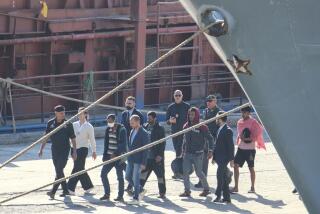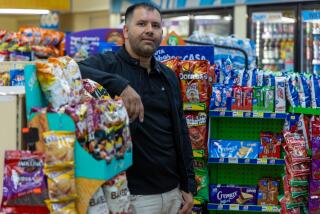First Wave of Kosovo Refugees Arrives in U.S.
- Share via
FT. DIX, N.J. — A deceptively upbeat band of Kosovo Albanians, victims of horrific ethnic purges in the Balkans, landed in rural New Jersey on Wednesday, waved to the cameras and began the bewildering process of living in America.
The Boeing 747 carrying 453 people from a squalid camp in Macedonia soared past the Statue of Liberty and touched down just outside this sprawling Army base, where the refugees were greeted by First Lady Hillary Rodham Clinton.
They were the first group of 20,000 ethnic Albanians that the United States has decided to lodge in order to ease the crushing tide of refugees on the lands surrounding Kosovo, the embattled province of Serbia. Most were elderly people or women, and nearly half were children--a compelling reminder of reports that men of fighting age have been at times systematically separated and slain in Kosovo.
Though some organizations are uneasy with the decision to spirit these ethnic Albanians so far from their homeland, some relief officials believe that the U.S. will be compelled to expand their numbers unless the conflict ends soon.
“If we continue to have this exodus, in the next three weeks 20,000 will be a drop in the bucket,” said John Fredriksson, associate executive director of Immigration and Refugee Services of America, which contracted to oversee the relocation. He noted that a small 1992 program to resettle Bosnian refugees has grown to the point where upward of 40,000 arrive annually.
Regardless of the ramifications, these refugees traded a crowded, disease-ridden refugee camp in Macedonia for the spanking-clean barracks complex of this lightly used training base near Trenton. Though many suffered unfathomable cruelties--a woman who watched two Serbian soldiers play catch with her severed breast is among the refugees expected--they are destined to become among the world’s best-cared-for displaced people.
“I know you have had a long journey and are very tired, but you look very good to me,” Clinton told the new arrivals as they sat in the bleachers of the base gymnasium, chanting, “USA, USA,” and cheering her remarks even before hearing them translated.
Most of the refugees were in good health and highly motivated to come here, said Roger Winter, head of the Immigration and Refugee Services of America.
Few of those who touched down here had ever left the Balkans. None had traveled by air. Nonetheless, at least some were in good spirits as they prepared to leave Macedonia. “We’re not going to have to worry about being tortured,” said Saide Sheriu, 31, whose 17-member family has been selected for resettlement. “We don’t have to hear bullets. We are a free family again.”
While undergoing days, perhaps weeks, of medical checks, security screening and eventual pairing with sponsor agencies and individuals, they will have beds with fresh linens, kitchens with ethnic food, toys for children and places to say Muslim prayers.
John Kidane, refugee resettlement director of the Nationalities Service Center in Philadelphia, said even refugees of often-ignored African conflicts have offered to sponsor these Kosovars.
“I even had Eritrean and Somali families who said they are willing to take a Kosovar family,” said Kidane, himself a refugee of the bloodshed between Eritrea and Ethiopia, which has displaced tens of thousands in recent months. “They said it reminds them of who they are.”
Almost all of the refugees who arrived in the first planeload are people without relatives in this country. Several hundred additional refugees are due here Friday, and another group that has family members here is scheduled to arrive Saturday in New York.
Though the aim of the North Atlantic Treaty Organization air war is to eventually repatriate these refugees, they are being given what so many seekers of sanctuary want: Priority One status, which gives them permanent residency, access to a wide range of cash and social service assistance, a green card after one year and, ultimately, the ability to seek full citizenship.
Though resettlement agencies are not looking for American roommates for the deportees, that hasn’t stopped people from offering to take them in.
“A lady called and said she lives alone in a mansion near New York--with her own lake--and she wants to take a family or two. And she said they could live there forever,” Kidane said.
The open arms for the Kosovo Albanians is bittersweet for Samuel Joe, a resettlement case manager and himself a refugee from Liberia. The U.S. last week indefinitely halted a resettlement program for Liberians living in Ivory Coast, he said, because the Ivorian government said it had become a magnet for those who want to use Ivory Coast as a springboard here.
Still, Joe, a former Liberian official, holds no grudges against the Kosovo Albanians. “I am overwhelmed by the destitution they are going through,” he said. “I would only hope that kind of reception would be extended to other refugees.”
The first group of refugees bound for the U.S. trudged toward the gates at the front of the camp at Brazda, Macedonia, at 3 a.m. Wednesday to board buses for the local airport. Some sobbed, others joked. Few had baggage.
Most said they were leaving only because they had grown sick of life in the camps, which have become increasingly overcrowded.
Igballe Osmani sobbed as she stood with her family. Her mother and sister were bound for Denmark. She, her husband and their four children were going to the U.S.
“We had to go somewhere to get settled down. We were sleeping on the ground,” Osmani said. “It’s very, very hard for me. We’ve never, never been apart.”
Either from worry or excitement, many of the refugees had not slept.
“I stayed up with some friends. They were crying. I was crying. I am going to miss Kosovo. But now I am excited to go to America,” said Remzi Arifi, 22, a student.
Fritz reported from Ft. Dix and Miller from Brazda.
More to Read
Sign up for Essential California
The most important California stories and recommendations in your inbox every morning.
You may occasionally receive promotional content from the Los Angeles Times.










